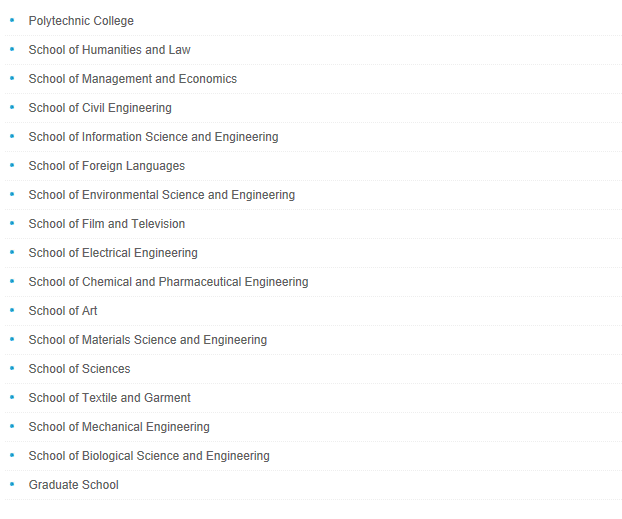
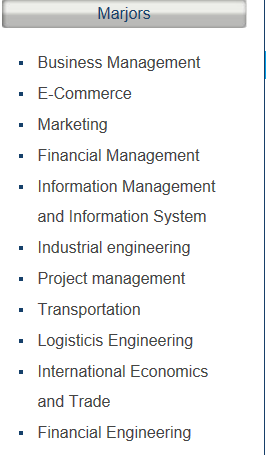

Civil Engineering Drawing Civil engineering drawing is a compulsory course of civil engineering, it solve the problem of the spatial geometry, introduce the theory and method of drawing and reading engineering drawings. This course through the study of projection of the basic theory and application to train the capability of illustration space geometry problem of students, it train the initial capacity of drawing and reading architecture engineering drawing and structural engineering drawing. This course train the students’ self-learning ability and the ability to analyze and solve problems, it also train the students’ responsible work attitude and meticulous work style. There are 88 class hours in this course, the practice of drawing 6 hours. Theoretical Mechanics Engineering mechanics is subdivided into three main divisions: statics (basic concepts and axioms of statics, force analysis, coplanar forces system, spatial forces system and friction), kinematics (motion of point, basic motion of rigid body, compound motion of moving point and planar motion of rigid body) and kinetics (differential equations of particle motion, theory of momentum, theory of moment of momentum, theory of kinetic energy and principle of D’Alambert). There are 56 class hours in this course. Through the course, the basic concepts and principles of mechanics are introduced, the reasoning and problem-solving skills are mastered by students. Mechanics of Materials The contents of Mechanics of Materials includes the calculation of internal force, stress and strength for members, the calculation of deformation, strain and stiffness of members, mechanical properties of materials and testing methods, stress state and theory of strength, the calculation of critical force, critical stress and stability. There are 80 class hours in this course including 6 test hours. Through the course, the students should be able to analyze and resolve some simple practical engineering problems by using the theory and method of Mechanics of materials. Structural Mechanics Structural Mechanics is unique to the professional civil engineering foundation courses. It is to train students to understand the civil engineering structure, to analyze the mechanical properties of civil engineering structures and thusly to master the principles and skills of designing structures. It is one of the main courses in this profession and occupies an important undergraduate teaching status. There are 88 class hours in this course. This course is to enhance the mechanical concepts of students, so that let them to master a variety of theories and methods of structural analysis. And also it is intended to make students to understand and grasp the mechanical properties of bar-system structures so as to develop their innovation and awareness of structures in the process of teaching objectives. Engineering Surveying The contents of the course mainly includes the spirit leveling, angle measurement, distance measurement and observation magement error, control survey of basic knowledge, topographic map of basic knowledge,the large scale topographic mapping and application, industry and civil building construction survey content etc. There are 48 class hours in this course including 8 test hours. The tests mainly include: the operation and use of the Bubble, the general spirit leveling, the operation and use of the theodolite ,Through the course, the basic knowledge of engineering surveying are introduced, the application of the measuring instruments is mastered by the students. And large scale topographic map reading and application are obtained by students. Instruction of Civil Engineering Instruction of Civil Engineering is a basic course of civil engineering. There are 32 class hours in this course. This course introduces the basic contents, principles and means of variety of civil engineering, and it also emphasis on its role in practice. Through learning this course, the abilities to deal with real projects will be trained for students, and the favor on their major courses will be improved. Civil Engineering Materials Civil Engineering Materials is a core curriculum for most civil engineering profession students. It is intended to introduce in detail the fundamental theories, knowledge and skills about the main civil engineering materials including lime, cement, concrete, aggregates, structural steel, asphalt binder and asphalt mixture. The primary goal is to assist a civil engineering or construction student in understanding how constructions differ in their physical, mechanical and chemical properties, and in selecting the right material from many thousand available ones. It also underlies a solid foundation for the successor specialization courses. Fluid Mechanics Fluid mechanics is a branch of applied (macro-) mechanics. Its content includes: (1)The principles of the static and motion of liquids and gases.(2)The action of solid on fluid.(3)The applications of these principles. Through the learning of this course, the student should be able to do the common hydraulic calculations in hydraulic engineering, master the fluid mechanics experimental technology, the method of solving the practical problem. Theory of Elasticity Theory of elasticity is the theoretical basis of solid mechanics. Its main task is to study the stress, strain and displacement and its distribution in the elastic mass due to external force, boundary constraint or temperature changes. There are 40 class hours in this course including: some basic concepts and basic assumptions, theory of plane problems, solution of plane problems in rectangular coordinates, theory of spatial problems, etc. During the study, students are enabled to analyze the stress and strain in the elastic mass, and further more to establish necessary theoretical basis of solid mechanics problems such as strength, stiffness, reliability, fracture and fatigue of structure in practical engineering. Reinforced Concrete and Masonry Structures It is an important professional basic course, mainly about concrete structure design theory and basic components. The course covers 90 class hours, from basic curriculum transition to the professional curriculum role of bridge. By learning this course, students should understand the concrete structural features and application, and grasp the concrete structure stress performance, calculation principles and design methods, and be familiar with the building and bridge of concrete structure design code for concrete structure design. After graduation the basis for continuing to study on concrete structure is laid. Civil Engineering Geology Civil engineering geology is an important professional basic course of civil engineering. There are 32 class hours including: mineral and rock, stratum and geological structure, underground water, engineering properties of rock and special soil, unfavorable geological phenomena and prevention and cure, underground engineering geological problems, groundation engineering geological problems, slope engineering geological problems, and engineering geology prospecting, etc. During this course, students should understand the basic knowledge of engineering geology, phenomenon and problems of engineering geology encountered in engineering construction and their influence, can analyze, estimate and solve common engineering geology problems using learned knowledge. Soil Mechanics and Foundation Engineering The contents of the course includes physical properties and engineering classification of soil, water flow through soil, stresses in soil, compression and consolidation of soil, shear strength of soil, earth pressure and retaining structures, slope stability, bearing capacity of foundations, shallow foundations analysis and design, pile foundations, special soil and ground treatments methods. There are 64 class hours in this course including 8 test hours. The tests mainly include: the tests of water content, density, specific gravity of soil particle; the test of consistency limit; consolidation tests; direct shear tests and triaxial compression tests. Through the course, the basic principles of soil mechanics are introduced, and the primary experimental ability is mastered by students. Besides the design abilities of retaining structures, shallow foundations and pile foundations are obtained by students. Steel Structure This course have 64 lessons and the main contents include that steel structural material, design method, structural damage forms, connections, tension members, axial compression members, flexural members, bending members and heavy plant structure design. Through this course, students can select steel material correctly; grasp the design of weld connections and bolts connections; comprehend steel structure basic components and complete the design of steel plant. Housing Architectonics The basic principles and methods of architectural design and structure is introduced in Housing Architectonics. The course also is one of the major basic professional courses, and it’s connecting link between the preceding and the following. This course includes 64 class hours, and its major task is to research the combination principle of components of building, methods of structure and designing principle of architectural space environment .Through this course, The elementary ability to be engaged in architectural designing of scheme and construction drawing will be obtained by students. Civil Engineering CAD Civil Engineering CAD is a special basic and required course for the Civil Engineering specialty. This course is one that has a practice character, and a following one for the Descriptive Geometry and Civil Engineering Drawing. This course mainly introduces a basic conception of CAD, and learns the software application of Auto CAD and Tarch, draw the design and civil engineering plan by using CAD technical.The purpose of this course is to make the students master the drawing the construction pattern by Tarch software starting from the basic concept of computer aided design and basing on the mastering of AutoCAD 2 d. Construction Project Budget The contents of construction project budget include of the classification, functions, contents, application of architectural engineering quota and the cost composition of installation engineering. Besides the detailed project quality list and cost management of building engineering also are introduced in this course. There are 32 class hours in this course. Through the course, the students can be familiar with architectural engineering quota, and grasp the construction and installation engineering cost composition, preparation of construction budget and the calculation methods of the detailed project quality list. Seismic Design of Building Structural seismic design includes: introduction, site and foundation, structural seismic response analysis and seismic calculation, multi-story masonry structure seismic design of reinforced concrete, high-rise building seismic design of structures, seismic design of high-rise steel structure, single building seismic design, isolation shock and structure control preliminary, et al. Through this course of study, Students can execute China's relevant laws and norms, It also can do Earthquake resistance and disaster mitigation planning to prevent or reduce the building, and master the skills of the earthquake damage, make the building earthquake resistance, as far as possible to reduce the damage and avoid loss of life and reduce economic loss. Construction and Organization Technology The contents of the course includes technique of earthwork, deep foundation engineering, masonry engineering, concrete structure engineering, pre-stressed concrete engineering, structure of building installation engineering, bridge engineering, road engineering, waterproof engineering, building decoration and finishing projects, the organization design of the unit engineering construction, the organization design of the general construction. There are 64 class hours in these courses. Through the course, the basic knowledge and skills of construction technology of civil engineering and construction management is mastered by students. Besides the ability of engineering construction and management, solving the practical problem, active exploration and innovation spirit are obtained by students. English of Civil Engineering English of Civil Engineering course includes building materials, construction engineering, construction, foundation, earthquake resistant structure design, etc. This course is a total of 32 hours, mainly introduces the basic characteristics of professional English, and the professional English in, centralized layout in the civil engineering professional literature reading material. Through the professional foreign language learning, to make the students master a certain number of civil engineering specialty English everyday vocabulary and technical terms, can the basic right to read and understand the professional English books and documents. To make the students will be able to use a foreign language the tools. Through reading the students can obtain foreign and the professional related scientific and technical information. Multilayer and tall building structure design This course is a threshold of civil engineering specialty courses. The aim and task of the course are to learn a multilayer and tall building structure design method. The course consists of 32 course hours. The main requirements include : understanding tall building structure system and various system features and scope of application; mastering the wind load and earthquake action calculation method; mastering the internal force and displacement calculation method for frame structure, shear wall structure, and frame shear wall structure with three kinds of basic structure; understanding structural internal force distribution and lateral deformation characteristic and law of those kinds; learning the three system frame and shear wall member reinforcement calculation and structural requirements. Through the studying of this course, mastering reinforced concrete structure seismic design theory and method. Structural Mechanics II Structural Mechanics II - thematic tutorial was published by Higher Education Press and edited by Long Yuqiu, Bao Shihua. This course have 7 chapters including statically indeterminate structure general, statically indeterminate structure general, ultra-energy principle, structural dynamic calculations, structure and stability calculations, ultimate load, structural mechanics and methodology and so on. This course can be used to cultivate civil engineering professional and technical personnel. Road and Bridge Engineering The contents of the course includes the basic features of bridge engineering, classification of structure , the main mechanical behavior and structural characteristics, the theory of design and calculation, as well as the manufacturing process and construction technology etc. There are 40 class hours in this course. Through the course, the basic knowledge of bridge engineering are introduced, and the general design principle and computation theory of bridge are mastered by students. Moreover, the bridge construction technology can be learned by students, and the bridge design foundations and construction foundations are obtained by students. Curriculum Design of Building Architecture Curriculum Design of Building Architecture is a practice teaching which is based on completing the theoretical teaching course work of architectural, and it‘s an effective means of summarizing the course content. It is aimed to consolidate and deepen the basic principle and knowledge of architectural and structural design. Moreover it is an essential way to train the students to utilize professional knowledge synthetically and improve students’ ability of application and practice. Steel Structure curriculum designThis design is the practical application of Steel Structure course. The design content is trapezoidal steel roof truss and design time is 2 weeks. Through this design, students can further comprehend on steel structure courses; learn how to use specifications, architecture drawing collections; cultivate some ability to solve practical project problems.
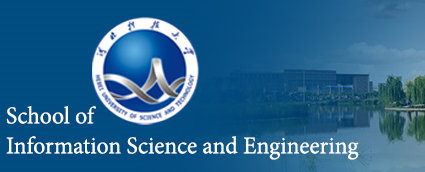
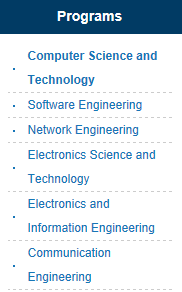

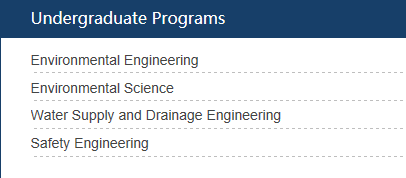

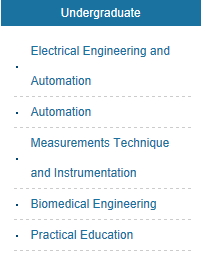

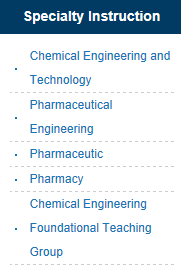


Metallic materials engineering: training senior engineering and technical personnel who have engaged in research and development, process and equipment design, production and operation management of the new materials work in the field of metal materials engineering. This specialty provides professional graduates for Hebei Province which experiences shortage for these professional talents , mainly in technology and management of all kinds of enterprises, research institutions engaged in the development and application of new materials, materials processing and surface treatment. Material forming and controlling engineering: training senior engineering and technical personnel who have engaged in the field of material molding and computer controlling engineering to do scientific research, technology and equipment design and control, production and operations management, and other aspects of the work. The specialty sets three directions: material liquid molding, solid-state connection and modern mold design and manufacture. The graduates have breadth of employment by enterprises, and they are for several years in short supply. Polymer materials and engineering: training senior engineering and technical personnel who have engaged in scientific research, technology development, process and equipment design, production and operations management work in areas such as polymer synthesis and processing of materials forming. There is a shortage of professionals in Hebei Province. Graduates with relevant technical are serious in shortage, and they have been in short supply. Inorganic non-metallic materials engineering: training senior engineering and technical personnel who have engaged in scientific research, technology development, process and equipment design, production and operation and management in the field of inorganic non-metallic materials, composites, and nonmaterial research and analysis, material preparation, materials, molding and processing aspects of the work of senior engineers and technicians. The professional talent is shortage in Hebei Province and the professional graduates engaged in technical and managerial work in the field have good employment prospects. Metallurgical Engineering: training advanced engineering and technical personnel with metallurgical physical chemical, steel and non-ferrous metallurgical knowledge. They have engaged in the production, design, research and management in the field of metallurgical engineering. The specialty is set up for the shortage of metallurgical engineering professionals. The prospects of the graduates’ employment are broad, and they major in various metallurgical enterprises and related enterprises engaged in technology, management.
 Information and Calculation Sciences Specialty Applied Physics Specialty Applied Mathematics Specialty Applied Chemistry Specialty
Information and Calculation Sciences Specialty Applied Physics Specialty Applied Mathematics Specialty Applied Chemistry Specialty
No. 26 Yuxiang Street, Shijiangzhuang, Hebei, P.R. China
Phone:0086-571-88165708,+86 15857187587
Fax:
Zip:
QQ:2853662504